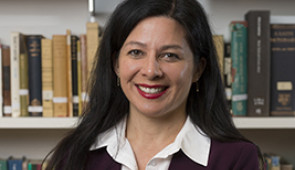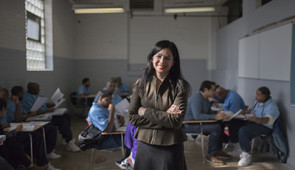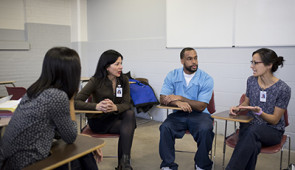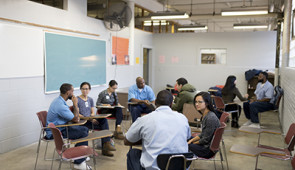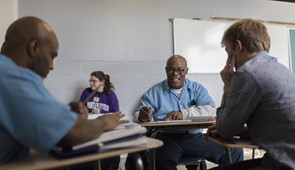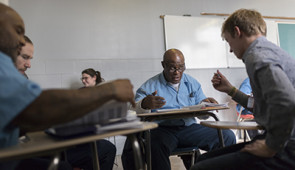Northwestern Prison Education Program receives $1 million Mellon grant
Funding will allow expansion and launch of first post-secondary educational program for incarcerated women in Illinois
- Link to: Northwestern Now Story
EVANSTON --- The Northwestern Prison Education Program (NPEP) has received a $1 million grant from the Andrew W. Mellon Foundation to support the expansion of educational opportunities for incarcerated people, including the first college-in-prison program for women in Illinois.
Less than two years after philosophy professor Jennifer Lackey welcomed the inaugural cohort of 22 incarcerated students to the first credit-bearing Northwestern course at Stateville Correctional Center in Crest Hill, Ill., the prison education program she founded is poised to become a national model.
Lackey and her collaborators, including faculty and students from a wide range of schools and departments at the University, aim to grow the early successes of the pilot program by establishing a statewide prison education system with a powerful voice in national policy conversations around mass incarceration and criminal justice reform.
With funding from the Mellon Foundation, to be provided over a three-year period, they plan to admit new cohorts of students, extend applications to minimum-security prisons, and invest in robust re-entry support for incarcerated students upon release.
Lackey said the plan also involves moving beyond providing education to developing solutions to America’s mass incarceration crisis by collaborating with the Northwestern Pritzker School of Law, the Alice Kaplan Institute for the Humanities, the Institute for Policy Research at Northwestern and other prison education initiatives at both the state and national levels.
A partnership among Northwestern, the Illinois Department of Corrections, and Oakton Community College, NPEP is intended to reduce recidivism while extending the benefits of a high-quality education to those behind bars. When it launched in 2018, it was the first program in the state to offer a comprehensive liberal arts curriculum to incarcerated students. Credit for those courses, conferred through the Northwestern School of Professional Studies, can now be applied to an Associate of General Studies degree awarded by Oakton.
“Education has been shown over and over again to be one of the most effective ways of positively intervening in the criminal justice system,” said Lackey, NPEP director. “Ideas demand to be shared, and so education builds connections that extend beyond the prison walls, even when all of the forces at work in your environment try to keep you isolated.”
Research has shown that while two-thirds of formerly incarcerated people will return to prison within three years, participation in prison education lowers the recidivism rate by 43 percent. One study found that the higher the degree earned, the lower the re-arrest rate — 14 percent for those who graduated with an associate degree, 5.6 percent for those with a bachelor's degree and zero percent for those with a master's degree. Additional studies have shown that prison education impacts the lives of everyone connected to a person who is incarcerated, most notably offering the chance to break the intergenerational cycle of poverty and incarceration.
“This education has been the purest form of love I have ever received,” Stateville student Abdul-Malik Muhammad said. “It’s been transformational and empowering, and I can’t wait to share it with the outside community!”
Lackey has been teaching classes at Stateville Correctional Center, an all-male, maximum-security state prison located in Crest Hill, Illinois, for the past six years.
While the state of Illinois already provides a range of educational opportunities in many of its 28 IDOC facilities, NPEP is the first to provide college degrees grounded in a full liberal arts curriculum, including courses in the social sciences, fine arts, humanities and STEM.
“Our partnership with Northwestern University in invaluable, and we are thrilled to be expanding this quality program to our Women’s Division,” said IDOC Director Rob Jeffreys. “A college degree allows returning citizens to obtain gainful employment and changes the trajectory of their children’s lives.”
Multimedia Downloads
Northwestern Prison Education Program images
Photo credit: Northwestern University
